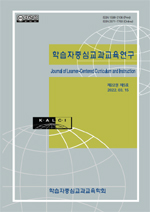대학생의 자기결정적 고독동기와 외로움에 따른 거부민감성, 정서지능, 자기수용의 차이
Differences in Rejection Sensitivity, Emotional Intelligence, Self-Acceptance according to Self-Determined Solitude Motivation and Loneliness
- 학습자중심교과교육학회
- 학습자중심교과교육연구
- 제22권 5호
-
2022.03105 - 119 (15 pages)
-
DOI : 10.22251/jlcci.2022.22.5.105
- 1,266

목적 본 연구는 대학생의 자기결정적 고독동기와 외로움에 따라 집단을 구분하고 각 집단이 거부민감성, 정서지능, 자기수용에서 차이가 있는지 확인하는 데 있다. 방법 본 연구는 부산광역시와 경상남도 소재 대학교 대학생들을 대상으로 자기결정적 고독동기 척도, 외로움 척도, 거부민감성 척도, 정서지능 척도, 자기수용 척도를 사용하여 설문조사를 실시하였다. 총 359부의 설문지를 배부하였으며, 그 중 누락되거나 불성실한 응답을 보인 9부를 제외한 총 350부를 분석 자료로 활용하였다. 자료분석은 SPSS 25.0 프로그램을 사용하여 기술통계분석, 상관분석, t검정, 일원배치 분산분석을 실시하였다. 결과 자기결정적 고독동기와 외로움 수준에 따라 네 가지 하위 집단으로 분류되었다. 분류된 집단은 특성에 따라 자발적 고독집단, 관계불안형 집단, 외로움집단, 친사회적 집단으로 명명하였다. 자발적 고독집단은 정서지능과 자기수용이 가장 높고 거부민감성이 낮은 특성을 보였다. 관계불안형집단은 거부민감성이 가장 높고 정서지능이 낮고 자기수용이 가장 낮은 특성을 보였다. 외로움집단은 거부민감성이 높고 자기수용이 낮고 정서지능이 가장 낮은 특성을 보였다. 친사회적 집단은 거부민감성이 가장 낮았으며 정서지능과 자기수용이 높은 특성을 보였다. 결론 이상의 결과들을 종합하여 볼 때, 고독은 적응적이고 외로움은 부적응적인 변인과 관련이 있으며 이는 서로 다른 변인임을 재확인한 연구이다. 자기결정적 고독동기와 외로움 수준에 따라 각 집단은 다른 심리적 특성을 보인다는 결론을 도출할 수 있다. 따라서 각 집단의 특성에 따른 상담적 개입과 프로그램 지원이 이루어져야 할 것이다.
Objectives The purposes of this study is to classify groups depending on self-determined solitude motivation and loneliness, and identify whether each group is different in rejection sensitivity, emotional intelligence, and self-acceptance. Methods This study conducted a survey to college students in Busan metropolitan city and Gyeongnam-do province using the scales of self-determined solitude motivation, loneliness, rejection sensitivity, emotional intelligence, and self-acceptance. 359 copies of the questionnaire were distributed, and 350 copies were used in analysis excluding 9 which had too many empty values or were answered insincerely. Data analysis was done using the SPSS 25.0 program on descriptive statistics, correlation analysis, t test, and one-way ANOVA. Results On the levels of self-determined solitude motivation and loneliness, this research classified respondents into four groups: the spontaneous solitude group, the relational anxiety group, the loneliness group, and the pro-social group. To analyze differences in rejection sensitivity, emotional intelligence, and self-acceptance, ANOVA statistical test was performed in this study. It was found that, for spontaneous solitude group, emotional intelligence and self-acceptance were the highest, and rejection sensitivity was low; for the relational anxiety group, rejection sensitivity was the highest, and emotional intelligence was low, and self-acceptance was the lowest; for the loneliness group, rejection sensitivity was high, emotional intelligence was the lowest, and self-acceptance was low; for the pro-social group, rejection sensitivity was the lowest, emotional intelligence and self-acceptance were high. Conclusions The above findings imply that, while solitude is related with adjustment variables, loneliness is elated with maladjustment variables. Depending on levels of self-determined solitude motivation and loneliness, each group show different psychological characteristics. Therefore, it is necessary to provide different consultation intervention and programs, considering characteristics of groups.
Ⅰ. 서론
Ⅱ. 연구 방법
Ⅲ. 연구결과
Ⅳ. 결론 및 제언
참고문헌
(0)
(0)